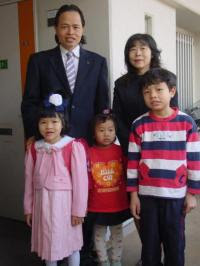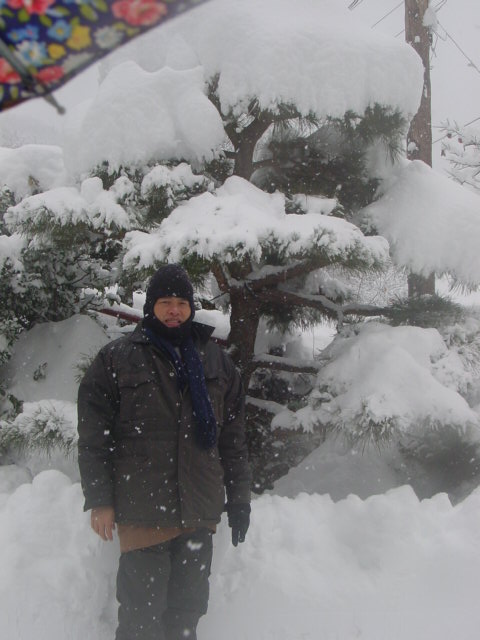 When I heard the crying voice of the homeroom adviser calling the name of the graduating class during the ceremony, the silence and solemnity of the audience and programme became clear. Silence manifests respect, love, honor and bonding between the teachers and the graduating children and the parents as well.
When I heard the crying voice of the homeroom adviser calling the name of the graduating class during the ceremony, the silence and solemnity of the audience and programme became clear. Silence manifests respect, love, honor and bonding between the teachers and the graduating children and the parents as well.A part of the program was the choir song of thanskgiving by the graduates. Later it was responded by the in-coming and next batch hoykuen children with sayonara rythm and song. The graduating class could not control their emotions but were crying infront of the younger kids and audience seeing their younger friends as their young brothers and sisters wishing them more for their shogakku (elementary) education. It was a moment of fraternal relations among the children in that school.

Eventually, when the ceremony was over, and the moment when the children marched for an exit but were met by their teachers at the aisle one-by-one and offered each of them a bouquet of flowers, the children were just naturally emotional to cry with thanks and gratitude to their teachers.
They marched proceeding to their homeroom, and when I tried documenting the march, I personally noticed the tears of love and bonding among the young kids to their teachers.
I have to reflected more on it.
From 8:00 o'clock in the morning to 5:30 in the afternoon, from Monday to Saturday, these kids are left by their parents in that hoykuen. Eventually, the parents could have their freedom to use their time for their work and employment. Teachers from that time start their day-caring and early childhood education to these young kids. There are those who are 2 and 2 and a half years old for toddlers, from 3 years old, for the nursery, and 4 years old, for kindergarten 1 and for 5 years old to six years old is the kindergarten 2 class respectively.
And the work could start from children's crying upon being left by the parents; the selfishness attitude of one against the other, fightings, screaming, toilet-calls for peeh or pooh, the bathing if not swimming, the clothing or changing of diapers, to classroom activities on teaching and singing songs, conversations, children's book-reading, counting, and others to their lunch time.
Teachers have to be mothers too to give nap time for the children after lunch singing lullaby and making their classroom as sleeping room with the small beddings left by the parents in the school. After nap time, they offer snacks to the kids, organize their playtime, or in-door activities like origami-time, blocks-organizing and the like.
Part of their major yearly program is to organize out-door activity like park-visiting and outdoor picnic, undukai or sports festival, happyokai or stage plays. My kids participated last year on these events. I was fortunate to see the sports festival and the stage plays where I was so proud on the performance of my first daughter who excel with great self-confidence in her role for their team. My youngest daughter was still young to perfect her role but it was a good beginning for her to have stage exposures at the age of 3 that time.
The swimming in their children's pool is also a challenging one as there is always a risk with the water and depth. The happyokai or stage play is a real legacy of ECE teachers to make their students be public entertainers infront of the exciting parents, grandparents and siblings of the kids. All these won't be forgotten by the young kids particularly their teachers, tutors, coaches and real friends in their young stage of development.
After I reflected on these, I really admire the crying children to have that nurtured heart to possess filial piety to their teachers at that young stage.
The crying teachers were also parental and loving to the young children whom they have been with in most of the time of their career and profession. They were socially one in that institution.
And graduation relatively separates them for further development in education. Although it is painful to separate, we can simply ignore that by recalling a quote, "no pain, no gain".
Omedito guzaimasu sensie!!!! Thank you too for being a nice parent to my child during those times!



No comments:
Post a Comment